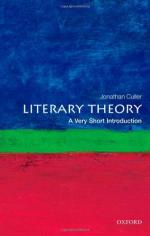
|
| Name: _________________________ | Period: ___________________ |
This test consists of 15 multiple choice questions and 5 short answer questions.
Multiple Choice Questions
1. According to Culler, what do many novels teach about heartache?
(a) It is part of life.
(b) It is the end of life.
(c) It is not common.
(d) It is fleeting.
2. What is a typical theme in literature?
(a) Character compassion.
(b) Deliberate violence.
(c) Family demoralization.
(d) Character identity.
3. Culler suggests that performative language aids is the understanding of ______________.
(a) Discourse.
(b) Conflict.
(c) Silence.
(d) Resolution.
4. For what type of performative theory was Judith Butler known?
(a) Roles in the workforce.
(b) Gender and sexuality.
(c) Religious phrasing.
(d) Political climate.
5. What type of performance describes a state of affairs that can be proven to be accurate or inaccurate?
(a) Constative.
(b) Advanced.
(c) Dismissive.
(d) Rushing.
6. Who was Judith Butler?
(a) An American philospher.
(b) A famous French speaker.
(c) A Harvard professor.
(d) A published fiction writer.
7. Culler reports that the use of a genre can do what for a reader?
(a) Inspire creativity.
(b) Create expectation.
(c) Falsify facts.
(d) Limit reading ability.
8. When a narrator only knows certain things, what is the narration called?
(a) Productive limited.
(b) Third person limited.
(c) Omniscient.
(d) Third person.
9. According to Chapter 8, what is the debate surrounding the "I" on a personal level?
(a) Free will vs. parental influence.
(b) Free will vs. predetermined choices.
(c) All of these.
(d) Free will vs. written influence.
10. According to Culler, what is a classic ideal that appears in many novels?
(a) A moral lesson.
(b) True love.
(c) Understanding of oneself.
(d) Truth and justice.
11. When a novel contains situations that should be intolerable, what are readers prompted to defy?
(a) Authority.
(b) Reading.
(c) Social injustice.
(d) Personal convictions.
12. According to Chapter 5, how should poems be read?
(a) In private.
(b) All at once.
(c) By the author.
(d) In sections.
13. What type of lyric is used in sublime poetry?
(a) Prolonged lyric.
(b) Advanced lyric.
(c) Foolish lyric.
(d) Extravagant lyric.
14. According to Culler, when it comes to performative language, what is required to give a word or a phrase weight?
(a) Spelling.
(b) Origin.
(c) Repeatability.
(d) Syllable count.
15. Who defined rhetoric as "the art of persuasion"?
(a) Socrates.
(b) Aristotle.
(c) Raphael.
(d) Michelangelo.
Short Answer Questions
1. According to Culler, when it comes to performative language, words create their own __________.
2. According to theorists, being lumped into a group identity poses what risk to an individual?
3. What era defined rhetoric as the study of structuring powers for discussion?
4. Who was Nancy Armstrong?
5. In Chapter 8, how is the true nature of a character often revealed in literature?
|
This section contains 428 words (approx. 2 pages at 300 words per page) |

|




